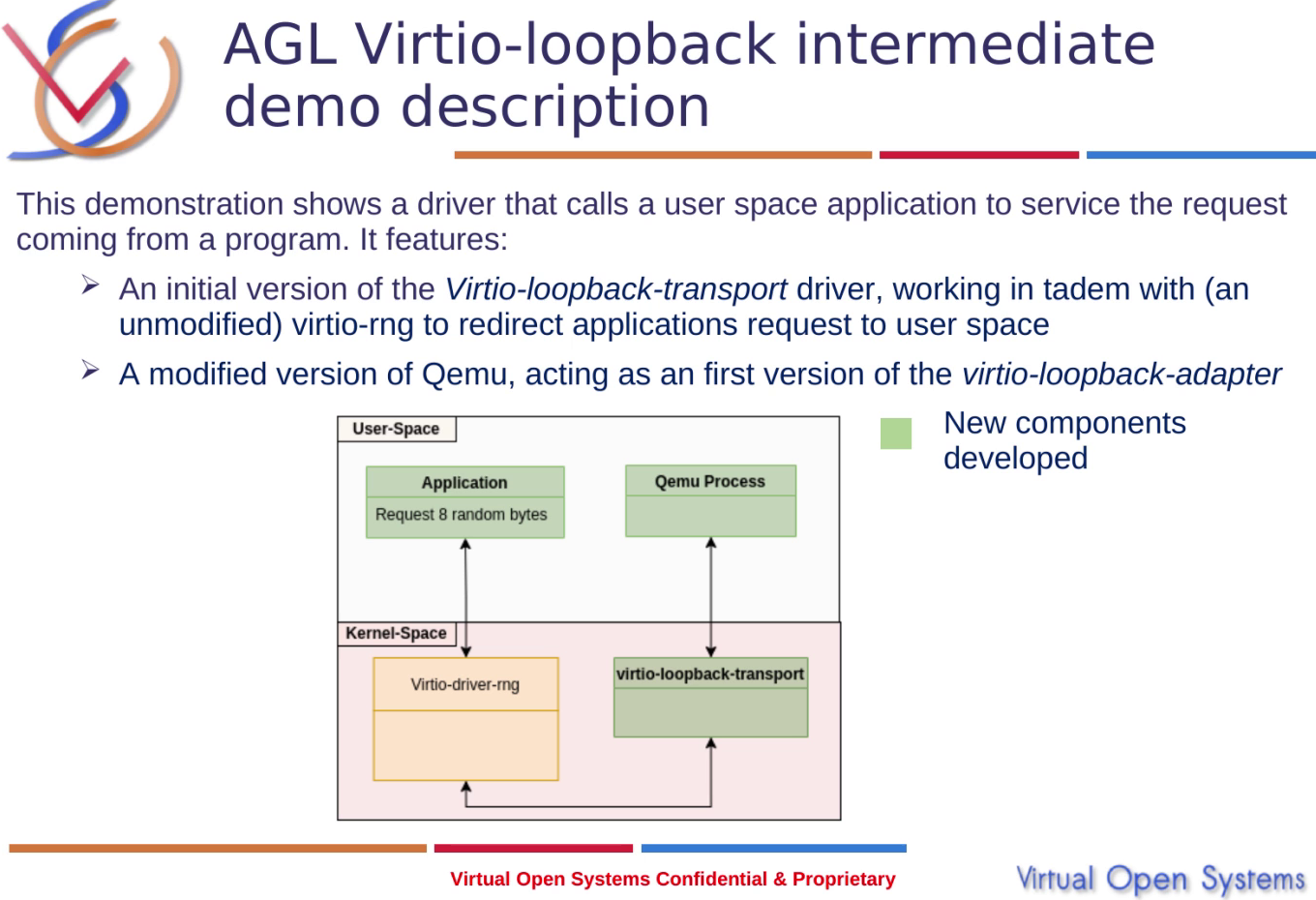virtio-loopback: an open source virtio-based Hardware Abstraction Layer (HAL)
Enable portable application-driver interactions on native and virtual machine environments supporting different hypervisors

Virtual Open Systems is developing virtio-loopback on behalf of the Linux Foundation for the Automotive Grade Linux (AGL) project. More in detail virtio-loopback is a virtio based hardware abstraction layer that gives user-space applications the ability to take advantage of user-space drivers using the standard virtio kernel interface. As a consequence, a user-space application can run transparently on both a native or a virtualized environment using user-space drivers with no code modifications. In addition virtio-loopback brings the following benefits:
- User-space driver implementations can be reused with both virtual and native environments.
- All the hypervisors that support virtio and vhost-user standards can be used with virtio-loopback.
- Data is shared between the virtio driver in kernel space and the device in user-space, thus guaranteeing high performance.
virtio-loopback is currently under development, and the video demo below shows an early version of the solution.

With virtio-loopback, applications using user-space drivers can be run seamlessly in both virtualized and non virtualized environments
virtio-loopback is composed by a new virtio transport kernel driver that forwards virtio calls in user-space (where the device is implemented) together with an application that implements the vhost-user protocol (introduced in QEMU for the first time in 2014 by Virtual Open Systems).
This video demo shows an early version of the virtio-loopback kernel components working with a virtio-rng device implemented in user-space (QEMU). More in detail, you will see a user-space application interacting with the kernel virtio-rng driver in the host that redirects requests to QEMU in user-space, where the device is implementated.
- Kvm on arndale exynos
- Kvm armv7 multiple guests poc
- Kvm full virtualization on vexpress
- Kvm vs tcg virtualized guests
- Byod android kvm on cortex-a15
- Kvm android guest on arm fastmodels
- Vosyshmem api remoting
- Virtual bfq in action
- Vosyswitch interop2017 shownet arm server
- Vosyswitch perf openstack integration
- Kvm virtualization training video
- Vosyswitch odp armv8
- Vosyswitch interop
- Vosysmonitor als2016
- Vosysmcs rcar forum 2018
- Vosysmonitor als2017
- Virtualizing fpga accelerators
- Memguard memtalk kvm armv8
- Vosysiot sido demo
- Vfpgamanager sdnnfv2018
- Vosysiot edge iotwc2018
- Vosysmonitor emcos ew2019
- Virtualizing stb lower tco
- Vosysmonitor mt2712 jp 日本語
- Vosysmonitor mt2712
- Vosysmonitor secure freertos optee linux
- Vosysmonitor emcos ew2019 jp 日本語
- Everest virtio fpga
- Vosysmonitorv risc v demo
- Vosysmonitorx86 demo
- Vosysmonitorv core sharing virtualization demo
- Wave fpga sriov
- Virtio loopback agl lf alpha release
- Risc v multiple os
- Virtio loopback sound agl
- K8s svff satcom wave
- Vmanager nancy outcome
 VOSySofficial
VOSySofficial




